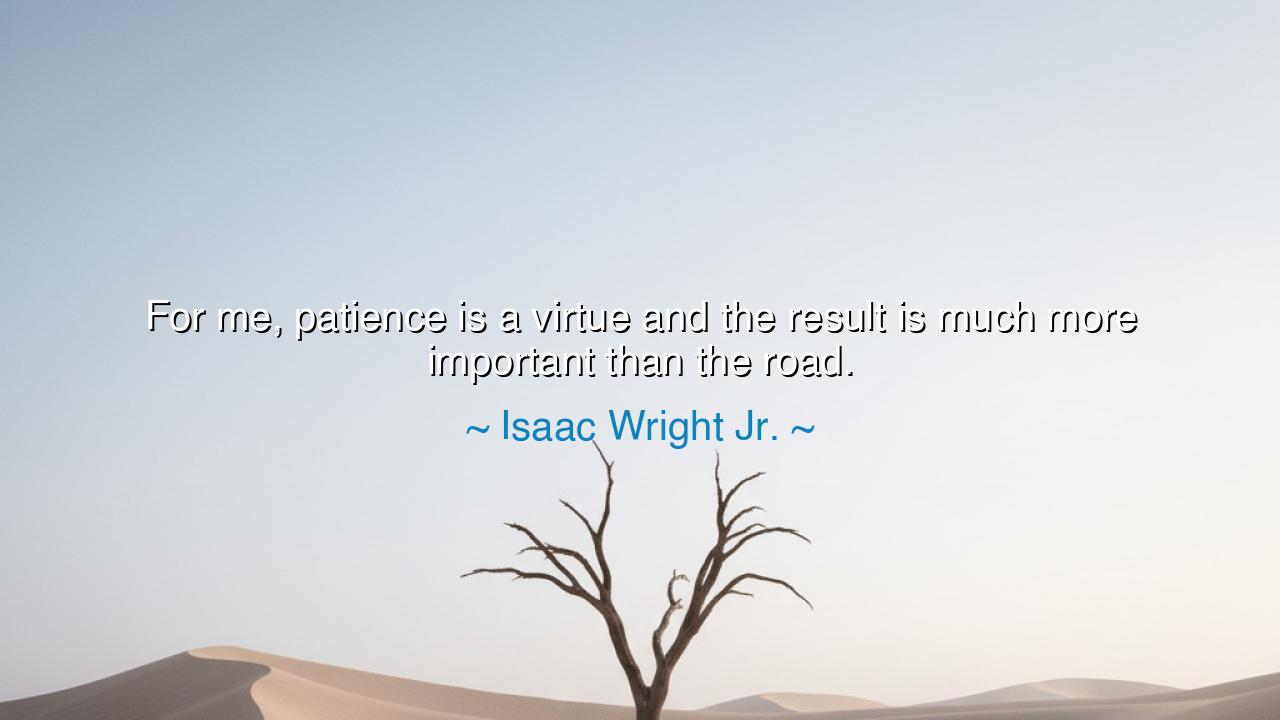
For me, patience is a virtue and the result is much more






The words of Isaac Wright Jr., a man who endured wrongful imprisonment and rose to become a champion of justice, are filled with the weight of lived truth: “For me, patience is a virtue and the result is much more important than the road.” In these words we hear the echo of endurance, the wisdom of one who has walked through trials few can imagine, and emerged with clarity. They speak to the eternal tension between the journey and the destination, between the pain of the path and the glory of the outcome.
The meaning begins with his reverence for patience. To call it a virtue is to recognize that it is not passive waiting but a form of inner strength. Patience is the shield that guards against despair when the road is long and filled with suffering. For Isaac Wright Jr., who spent years behind prison walls for crimes he did not commit, patience was not optional — it was survival. Through it, he discovered that no matter how cruel or unjust the road, the enduring spirit can carry a man toward vindication and victory.
He then declares that the result is much more important than the road. These words may seem to run against the teachings of those who exalt the journey itself. But in Wright’s case, they hold profound truth. For him, the road was filled with injustice, pain, and hardship — but the result was freedom, redemption, and triumph. His message is clear: though the path may break the body, it cannot break the spirit if the goal remains in sight. The destination, once reached, redeems the suffering of the road.
History gives us mirrors to this wisdom. Consider the story of Joseph in Egypt, sold into slavery by his brothers, cast into prison by false accusation, yet rising to power and saving nations from famine. His road was cruel, but the result was glorious, and in the end, he could see purpose in his trials. Or look to Nelson Mandela, who endured twenty-seven years in prison. His road was long, filled with pain, but the result was freedom for his people and the dismantling of apartheid. In each, we see Wright’s wisdom: it is the outcome, not the suffering of the road, that defines destiny.
This teaching is not an excuse to ignore the lessons of the journey, but a call to keep the eyes fixed upon the result. Many become weary because they mistake the trials of the road for the end itself. They forget that storms do not last forever, that prisons do not hold the soul, and that pain is temporary but triumph is eternal. Patience allows the traveler to keep walking, step after step, even when the road is cruel, because the vision of the result is brighter than the darkness of the present.
The lesson for us is timeless. When you face injustice, hardship, or delay, remember that the road is not the measure of your life — the result is. Cultivate patience, for it will protect you from despair. Keep your eyes on your purpose, for it will give meaning to every step. Do not curse the road, no matter how bitter, but trust that the destination will justify the pain. And when you finally arrive, the road will fade behind you, and only the result will shine.
Practical actions follow from this wisdom. Define your result clearly — whether it is justice, freedom, love, or achievement. Hold to it with unshakable faith. Endure the road with patience, refusing to give in to bitterness. When delays come, do not surrender; when obstacles rise, do not turn back. Use the trials of the road to strengthen your spirit, but never confuse them for your destiny. The road is temporary; the result is eternal.
Thus, Isaac Wright Jr.’s words endure as both warning and encouragement: “Patience is a virtue and the result is much more important than the road.” Let each generation remember that though life’s path may be cruel, the destination is worth the suffering. For in patience lies strength, in endurance lies victory, and in the result lies the vindication of all who refuse to give up.






AAdministratorAdministrator
Welcome, honored guests. Please leave a comment, we will respond soon